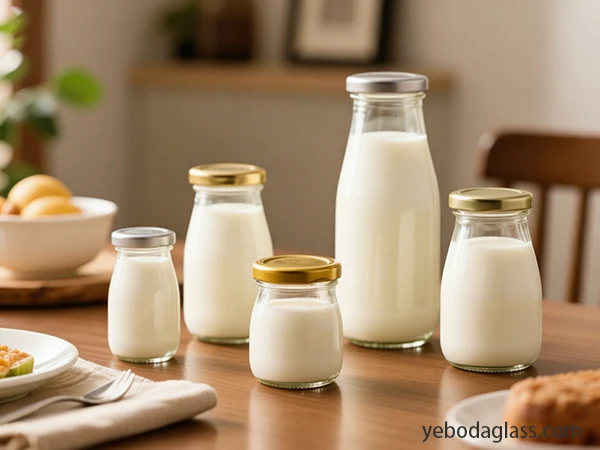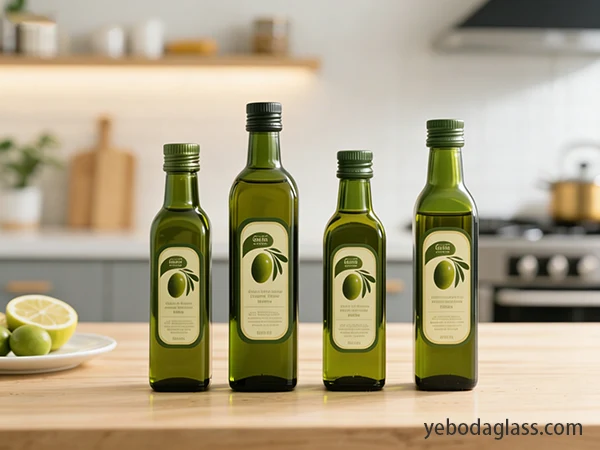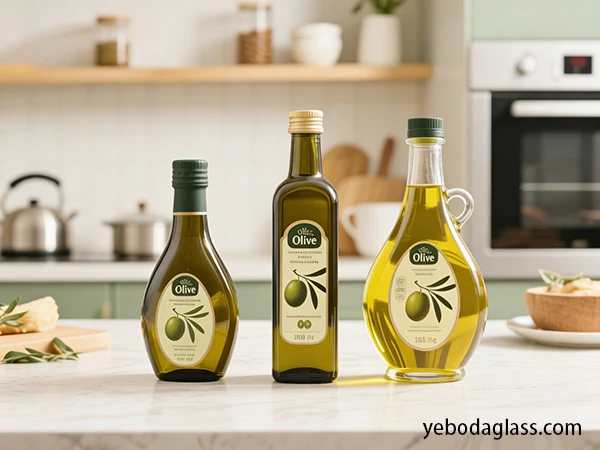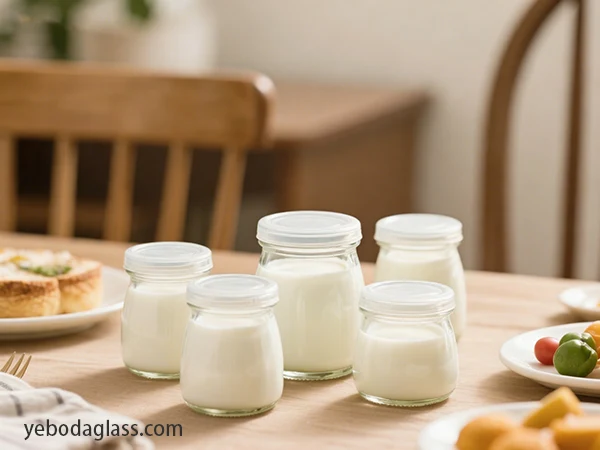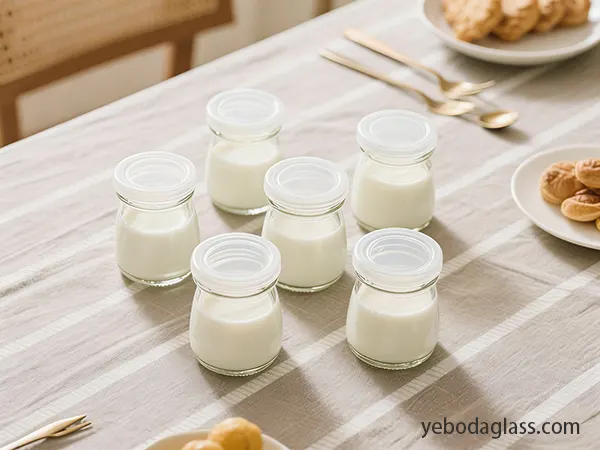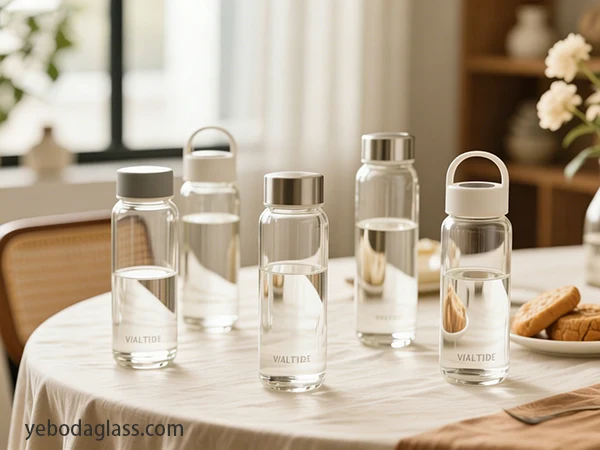الملخص التنفيذي
يقدم هذا التقرير خفض تكلفة العلامة التجارية وزيادة قيمتها من خلال عملية شراء بالجملة مخططة استراتيجياً لزجاجات الزيت. Glass oil bottles wholesale تُعدّ هذه الممارسات مفيدة اقتصاديًا للغاية لأي علامة تجارية أو نوع من أنواع الزيوت. تستعرض الورقة البحثية تحسين تكلفة الوحدة المباشرة، وكفاءة سلسلة التوريد، والامتثال التنظيمي، والآثار طويلة الأجل لمبادرات الاستدامة، وتكشف أن زجاجات زجاجية غالبًا ما تحقق نتائج أفضل من البدائل البلاستيكية أو المعدنية أو الأكياس. صحيح أن تكاليف الوحدة الأولى قد تكون أعلى في بعض الحالات، إلا أن الفوائد طويلة الأجل - كسلامة المنتج، وتقليل المخاطر، وتحسين صورة العلامة التجارية - تؤدي عادةً إلى نتائج مالية أفضل. ومن أهم المزايا التي يمكن أن تجنيها العلامة التجارية من هذا التعاون مع مورد موثوق به مثل نعم نعم. يتمثل جوهر الأمر في إنتاج سلع عالية الجودة، وتوفير إمدادات ثابتة، وأسعار تنافسية وجذابة للكميات الكبيرة. تستفيد العلامات التجارية من وفورات الحجم، وتحصل على أولوية الوصول إلى التصاميم الجديدة، وتتمتع بجودة ثابتة، مما يجعل عبوات زيت يبودا الزجاجية بالجملة عنصرًا بالغ الأهمية في أي استراتيجية لتوريد مواد التعبئة والتغليف. ويختتم التقرير بتوصيات عملية ورؤى حول الاتجاهات المستقبلية، مؤكدًا أن عبوات الزيت الزجاجية لا تُسهّل الكفاءة التشغيلية فحسب، بل تُعزز أيضًا قيمة العلامة التجارية.
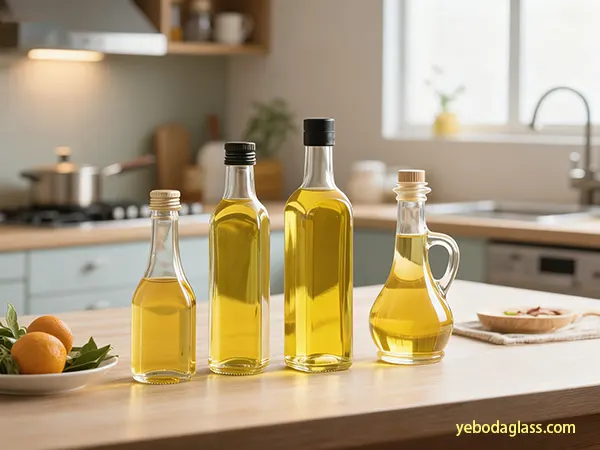
مقدمة وتحديد نطاق البحث
يُعدّ التغليف شريان الحياة لهوية العلامة التجارية والمحرك الرئيسي لمبيعاتها. ويؤثر اختيار التغليف تأثيرًا بالغًا يتجاوز مجرد سلامة المنتج وتصور المستهلك، إذ يؤثر أيضًا على شبكة التكاليف التشغيلية المعقدة للعلامة التجارية بأكملها. ويلعب الزجاج دورًا محوريًا بين مواد التغليف في سوق الزيوت، وهو سوق لا يقتصر على المواد الغذائية الأساسية فحسب، بل يشمل أيضًا مشتقات طبيعية وتجميلية باهظة الثمن. فالزجاج هو الوسيلة التي ستكون على اتصال مباشر بالعميل، وبينما يحمي المحتويات، فإنه يشكل أيضًا أساسًا لنشر هوية العلامة التجارية. يجيب هذا التقرير على سؤال: لماذا يُعدّ التغليف أهم أداة لترشيد التكاليف لأي علامة تجارية؟ ويتعمق في المزايا العديدة لزجاجات الزيوت بالجملة كحل تغليف مصمم خصيصًا لترشيد التكاليف للعلامات التجارية. لقد طورنا نظامًا معياريًا دقيقًا للغاية يعتمد عليه تحليلنا للوصول إلى العمق المطلوب والحفاظ على أهميته.
اعتبارات نوع الزيت الأساسي
يغطي التقرير مجموعة واسعة من أنواع الزيوت التي تؤدي إلى مشاكل تغليف مختلفة وتخلق ظروفًا مختلفة:
- الزيوت الصالحة للأكل (على سبيل المثال، زيت الزيتون، زيت الأفوكادو، زيت عباد الشمس): للحفاظ على النكهة، ومنع أي تفاعلات كيميائية، والامتثال لمعايير سلامة الغذاء، من الضروري استخدام عبوات محايدة. وغالبًا ما تكون الحماية من الأشعة فوق البنفسجية ضرورية أيضًا لمنع المنتج من التزنخ. تُشكل زجاجات الزيت الزجاجية، التي تُباع بالجملة، حاجزًا قويًا ومحايدًا، مما يحافظ على نضارة الزيوت ليس فقط أثناء التخزين، بل وأثناء النقل أيضًا.
- الزيوت العطرية (مثل: اللافندر، شجرة الشاي، النعناع): نظراً لتركيزها العالي وسرعة تبخرها، تتطلب الزيوت العطرية عبوة محكمة الإغلاق تحميها من التلف بفعل الضوء أو التفاعل مع مادة العبوة. والهدف الأساسي من استخدام زجاجات الزيوت العطرية ذات اللون الكهرماني أو الأزرق الكوبالتي هو منع وصول الأشعة فوق البنفسجية إلى محتواها.
- الزيوت التجميلية (مثل زيت الجوجوبا، زيت الأرغان، الأمصال): تُعدّ ثبات المنتج وجاذبيته ودقة جرعاته من أهمّ النقاط هنا. تُمكّن زجاجات الزيت الزجاجية التي تُشترى بكميات كبيرة العلامة التجارية من الحصول على منتج فاخر ذي تشطيب ليس عمليًا فحسب، بل يُساهم أيضًا في تعزيز صورة العلامة التجارية.
- زيوت CBD: إلى جانب تثبيت المنتج ومنع تلفه، يجب أن تتوافق العبوة مع اللوائح الأخرى، مثل أن تكون مزودة بأغطية مقاومة للأطفال ومحمية من الأشعة فوق البنفسجية. شراء عبوة واحدة من زجاجات الزيت بكميات كبيرة يضمن استيفاء المتطلبات باستمرار وأن تكون العبوة ذات جودة عالية.
نطاق العلامة التجارية المستهدفة
تُرى تكتيكات تحسين التكاليف من خلال عدسة مؤسسة ذات أحجام مختلفة:
- الشركات الناشئة: أحجام أولية منخفضة للغاية، وحساسية كبيرة لتكاليف الوحدة الواحدة، والحاجة إلى حلول قابلة للتطوير في تجارة الجملة لزجاجات الزيت.
- الشركات الصغيرة والمتوسطة (SMEs): يهدفون إلى تحسين الكفاءة والتحول تدريجياً إلى طلبات بيع بالجملة أكبر للزجاجات.
- الشركات الكبيرة: سلاسل التوريد العالمية المعقدة تسعى جاهدة لتحقيق شراكات استراتيجية طويلة الأجل واستقرار التكاليف لتجارة الجملة لزجاجات الزيت.
الاعتبارات الجغرافية
تُعد الاختلافات المحلية في الخدمات اللوجستية والأطر التنظيمية وديناميكيات السوق ذات أهمية قصوى:
- أمريكا الشمالية: يميل المستهلكون بشدة إلى استخدام زجاجات الزيت الزجاجية المستدامة، ومع ذلك، تتطلب اللوائح على مستوى الولاية إيلاء اهتمام دقيق للامتثال.
- الاتحاد الأوروبي (EU): إن ممارسات إعادة التدوير والاقتصاد الدائري التي يتم الترويج لها في المنطقة أكثر ملاءمة للزجاجات الزجاجية مقارنة بالزجاجات البلاستيكية.
- منطقة آسيا والمحيط الهادئ (APAC): إلى جانب امتلاكها لتصنيع تنافسي من حيث التكلفة، تشهد المنطقة نموًا سريعًا في الطلب على زجاجات الزيت الزجاجية الممتازة بالجملة.
المقارنة المعيارية مع المواد البديلة
ولتوضيح الأمر، تتم مقارنة الزجاجات الزجاجية مع العبوات الأخرى:
- البلاستيك (PET، HDPE): خفيف الوزن، لكن مع احتمال تسرب المواد الكيميائية وظهور مشاكل بيئية.
- المعادن (علب/زجاجات الألومنيوم): خفيف الوزن ويوفر الحماية، ولكنه لا يحظى بسمعة ممتازة بالنسبة للزيوت.
- الأكياس (التغليف المرن): يتم استخدام كمية قليلة جداً من المواد، ولكن هناك مشاكل تتعلق بإمكانية إعادة الاستخدام وحماية المنتج.
يوضح التقرير، من خلال تحديد هذه المعايير، كيف يمكن للعلامات التجارية استخدام زجاجات الزيت بالجملة لتحقيق وفورات كبيرة واكتساب مزايا ذات طبيعة استراتيجية.
تم تحقيق التحسين المباشر لتكلفة الوحدة من خلال بيع زجاجات الزيت بالجملة
إن التأثير الأبرز والأكثر وضوحاً لشراء زجاجات الزيت بالجملة هو الانخفاض الفوري في تكلفة الوحدة. ويعود هذا التحسن بشكل رئيسي إلى عوامل مترابطة كلياً أو جزئياً، وتتمحور حول مفهوم وفورات الحجم وعلاقات الموردين الاستراتيجية.
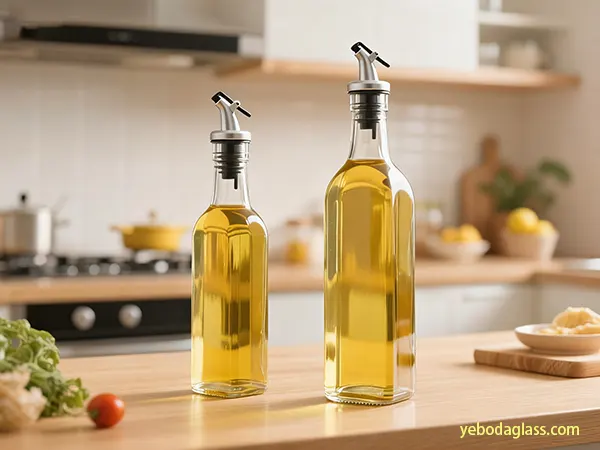
وفورات الحجم في تصنيع زجاجات الزيت بالجملة
إنتاج الزجاج عملية تتطلب استثمارات ضخمة. تتيح طلبات الجملة لعبوات الزيت الزجاجية بكميات كبيرة لمنتجي الزجاج تسريع الإنتاج وتقليل أوقات تغيير خطوط الإنتاج وزيادة كفاءة استخدام الآلات. كما يمكنهم خفض متوسط تكلفة الوحدة من خلال التشغيل المتواصل، وبالتالي توفير هذه التكاليف للمشترين بالجملة. أما بالنسبة للزيوت الفاخرة، فإن تجانس عبوات الزجاج هو العامل الرئيسي الذي يضمن الحد الأدنى من الهدر وأقصى كفاءة في عملية الإنتاج.
خصومات الشراء بالجملة
تؤدي نماذج التسعير ذات المستويات المتعددة لزجاجات الزيت بالجملة إلى زيادة حجم المشتريات. فعند تغيير الطلبات من صندوق واحد إلى منصة نقالة أو حاوية، تنخفض تكلفة الوحدة بشكل ملحوظ. وتنتج هذه الوفورات عن تبسيط العمليات اللوجستية، وتقليل الأعمال الإدارية، وتحسين التدفق النقدي للموردين.
اتفاقيات التوريد طويلة الأجل
- استقرار الأسعار: تساهم الأسعار الثابتة في تعويض تقلبات أسعار المواد الخام أو الطاقة.
- إمداد مضمون: يحافظ على إمداد الزجاجات بشكل ثابت وموثوق.
- تطوير القوالب المخصصة: تقاسم تكلفة الاستثمار الأولي في تصميمات الزجاجات الفريدة على عدد كبير من الطلبات.
- حالة العميل المفضل: تُمنح الأولوية للشركاء على المدى الطويل في مجال الابتكارات والدعم الذي يساعد على جعل عمليات الشراء أكثر كفاءة.
مزايا الزجاج كمادة للزيوت الحساسة
يتمتع الزجاج بهذه المزايا:
- همود: لا يوجد تفاعل كيميائي أو تسرب، مما يحافظ على الزيت كما هو عند صنعه لأول مرة.
- خصائص الحاجز: يحمي الزيت من الأكسجين والرطوبة والأشعة فوق البنفسجية، وبالتالي يطيل فترة صلاحيته.
- الإدراك المتميز: يساعد ذلك العلامة التجارية على ترسيخ مكانتها، وبالتالي يصبح من الممكن الوصول إلى أسعار أعلى.
في الواقع، تمثل زجاجات الزيت بالجملة مزيجًا من التوفير الفوري في التكاليف وفرص تحسين الإيرادات على المدى الطويل.
كفاءة سلسلة التوريد وتكاليف التشغيل
إن قرار شراء زجاجات الزيت بالجملة لا يؤدي فقط إلى سلسلة توريد أكثر كفاءة، بل يؤدي أيضًا إلى انخفاض في التكاليف غير المباشرة.
الخدمات اللوجستية للشحن الأمثل
عند شراء الزجاجات بكميات كبيرة، فمن الممكن القيام بما يلي:
- الشحن بالشاحنات/الحاويات الكاملة (FTL/FCL): خفض تكاليف النقل للوحدة الواحدة بشكل ملحوظ.
- التوصيل المباشر إلى المستودع: يقلل من عمليات المناولة الوسيطة التي تصاحب توصيل البضائع إلى الشاحنات.
- تحسين الخدمات اللوجستية الإقليمية: بإمكان الشركات الكبيرة خفض النفقات عن طريق توحيد طلبات مراكزها الإقليمية لزجاجات الزيت بالجملة.
انخفاض نفقات التخزين
تُسهّل عمليات التسليم بالجملة ما يلي:
- شحنات أقل حجماً وأكبر حجماً
- تحسين استخدام مساحة التخزين
- انخفاض تكاليف دوران المخزون
تبسيط عمليات المناولة وتكاليف العمالة
ساهمت الأتمتة والمنصات القياسية في تقليل العمالة اللازمة لمناولة وتعبئة وتغطية ووضع الملصقات على زجاجات الزيت. علاوة على ذلك، ساهمت الجودة المتسقة للمنتجات من موردي زجاجات الزيت بالجملة ذوي السمعة الطيبة في خفض تكاليف إعادة العمل ومراقبة الجودة بشكل كبير.
انخفاض معدلات الكسر
تتميز الزجاجات الزجاجية عالية الجودة التي يتم شحنها بالجملة على منصات نقالة محمية جيدًا بانخفاض معدل الكسر مقارنة بتلك المصنوعة من مواد أقل متانة، مما يؤدي إلى منع كل من فقدان المنتجات والضرر الذي يلحق بالسمعة والذي يمكن أن يكون مكلفًا للغاية.
توفير التكاليف من خلال الامتثال التنظيمي وتخفيف المخاطر
تُعدّ زجاجات الزيت بالجملة مثالاً مثالياً على كيفية تبسيط الامتثال وتقليل المخاطر إلى أدنى حد:
- سلامة الأغذية وخمولها: لم يعد المنتج بحاجة للقلق بشأن تسرب المواد الكيميائية.
- استقرار المنتج وفترة صلاحيته: إن استخدام الزجاج الكهرماني أو الملون يحمي الزيوت من التهيج الناتج عن أشعة الشمس.
- التوافق الكيميائي: إحدى الفوائد الرئيسية هي أن المنتج مناسب للزيوت الأساسية والتجميلية وزيوت CBD.
يمكن ترجمة انخفاض مخاطر سحب المنتجات وتحسين ثقة العلامة التجارية إلى وفورات مالية وسمعية تؤدي في النهاية إلى وضع أقوى في السوق.
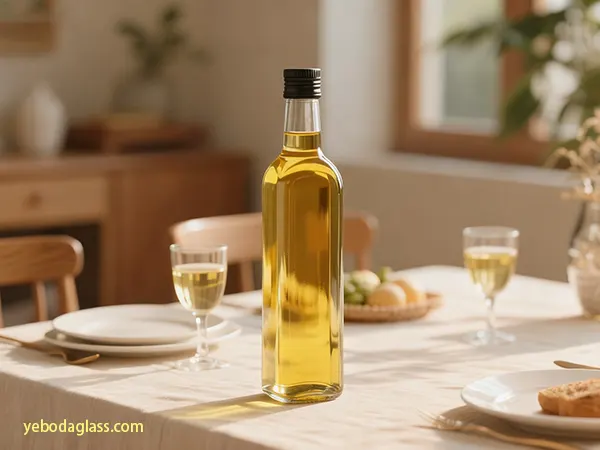
تحليل التكلفة الإجمالية للملكية (TCO): الزجاج مقابل البدائل
مكونات التكلفة الإجمالية للملكية
- تكاليف الاستحواذ: يتم تخفيض السعر الإضافي الأولي عن طريق شراء زجاجات الزيت بالجملة.
- التكاليف التشغيلية: هناك كفاءات في التعبئة والمناولة والشحن.
- التكاليف غير المباشرة: تلف الطعام، والامتثال التنظيمي، وسحب المنتجات، وقيمة العلامة التجارية.
التحليل المقارن
| عامل التكلفة | زجاج | بلاستيك PET | الألومنيوم |
| تكلفة الوحدة | متوسط-عالي | قليل | واسطة |
| شحن | أعلى ولكن مُحسَّن عبر بيع زجاجات الزيت بالجملة | قليل | قليل |
| التخزين | يقلل التخزين القوي والكمي من الحاجة إلى العمالة | خفيف الوزن | خفيف الوزن |
| تلف المنتج | منخفض جداً | متوسط-عالي | قليل |
| الامتثال التنظيمي | قليل | متوسط-عالي | قليل |
| خطر الاستدعاء | منخفض جداً | واسطة | قليل |
| سمعة العلامة التجارية | عالي | واسطة | واسطة |
| إعادة التدوير | قليل | متوسط-عالي | قليل |
زجاجات توفر تكلفة إجمالية أقل للملكية مقارنة بالبدائل الأخرى نظرًا لمتانتها والتزامها بالمعايير وصورة علامتها التجارية.
مبادرات الاستدامة وخلق القيمة
تقليل النفايات والاقتصاد الدائري
الزجاجات الزجاجية قابلة لإعادة التدوير دون أي قيود، مما يعني أنها يمكن أن توفر تكاليف من خلال انخفاض رسوم التخلص منها، وحتى في حالة وجود برامج لإعادة الاستخدام.
محتوى معاد تدويره (زجاج PCR)
إن إنتاج زجاجات الزيت بالجملة من الزجاج المعاد تدويره بعد الاستهلاك لا يوفر الطاقة فحسب، بل يقلل أيضًا بشكل كبير من البصمة الكربونية، وبالتالي يحسن من مصداقية العلامة التجارية في مجال الاستدامة.
إمكانية إعادة الاستخدام ومشاركة المستهلك
يمثل العملاء الذين يشترون عبوات زجاجية قابلة لإعادة التعبئة مصدر دخل للعلامات التجارية، حيث يمكنهم من خلالها تعويض تكاليف الإنتاج، بالإضافة إلى بناء قيمة العلامة التجارية والمجتمع.
تفضيلات المستهلك والتمايز السوقي
سيشتري المستهلكون الواعون بيئياً زجاجات الزيت الزجاجية بالجملة، مما يُمكّن العلامة التجارية من ترسيخ مكانتها كمنتج فاخر، وبالتالي ستشهد نمواً في حجم مبيعاتها. ويُعدّ استخدام التغليف المستدام عاملاً مهماً للتميّز في الأسواق شديدة التنافس.
التقارير البيئية والاجتماعية والحوكمة وعلاقات المستثمرين
إذا قررت شركة ما اعتماد حل بيع زجاجات الزيت الزجاجية الصديقة للبيئة بالجملة، فسيكون لذلك تأثير إيجابي على تصنيفات الحوكمة البيئية والاجتماعية والمؤسسية، وبالتالي ستصبح الشركة أكثر جاذبية للمستثمرين المسؤولين اجتماعياً، مما سيدعم استقرارها المالي على المدى الطويل.
التوصيات الاستراتيجية والتوقعات المستقبلية
استراتيجيات شراء زجاجات الزيت بالجملة
- تطوير علاقات مع الموردين تمتد لسنوات عديدة
- تطبيق التنبؤ الفعال بالطلب
- استخدم العلامة التجارية لإضفاء طابع شخصي على منتجك
- تحقيق أقصى استفادة من الشحنات الكبيرة من خلال التخطيط اللوجستي الجيد
- اجمع بين مراعاة البيئة والمشتريات
- اتخذ قراراتك من خلال تطبيق منظور التكلفة الإجمالية للملكية (TCO).
الاتجاهات الناشئة
- تقنيات تخفيف الوزن: الزجاجات الزجاجية الأخف وزنًا ولكنها لا تزال متينة
- الطلاءات المتقدمة: Made your goods less vulnerable to scratches and impact
- التغليف الذكي: Provide glass oil bottles wholesale with QR/NFC enabled packaging
- زيادة محتوى تفاعل البوليميراز المتسلسل (PCR): عملية صديقة للبيئة وموفرة للطاقة
- الأتمتة والذكاء الاصطناعي: Efficacy is at a higher level thus costs are stable
عوامل التكلفة والفرص المستقبلية
- تكاليف الطاقة: يمكن تثبيت أسعار الزجاج إذا تم استخدام الطاقة المتجددة
- توافر المواد الخام: استخدام زجاج تفاعل البوليميراز المتسلسل كحل لمشكلة ندرة الموارد
- التحولات التنظيمية: يدعم الزجاج بدلاً من البلاستيك
- طلب المستهلك: سيكون الدافع نحو الاستدامة هو السبب وراء شعبية زجاجات الزيت الزجاجية الممتازة بالجملة بين المستهلكين
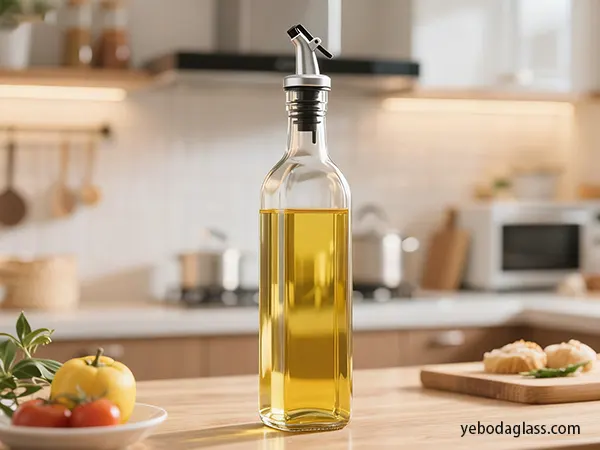
خاتمة
إنّ شراء عبوات الزيت الزجاجية بالجملة، إلى جانب كونه قرارًا يتعلق بالتغليف، يُعدّ في جوهره استراتيجية عمل طويلة الأمد. فمن خلال الإدارة الفعّالة للتكاليف المباشرة وغير المباشرة، وتقليل المخاطر، وتعزيز قيمة العلامة التجارية، وتبنّي المبادرات الصديقة للبيئة، تستطيع العلامات التجارية تحقيق مزايا ملموسة مقارنةً باستخدام مواد بديلة. وتُظهر عبوات الزيت الزجاجية بالجملة عائدًا إيجابيًا على الاستثمار بمرور الوقت من خلال الكفاءة والامتثال والتميّز في السوق، ما يضمن نجاحًا مستدامًا في ظلّ تغيّر متطلبات المستهلكين واللوائح التنظيمية.

